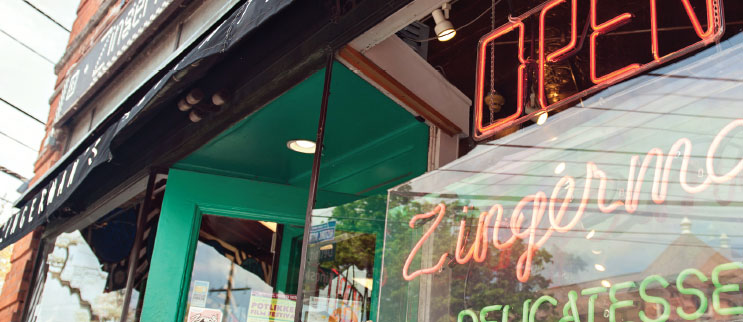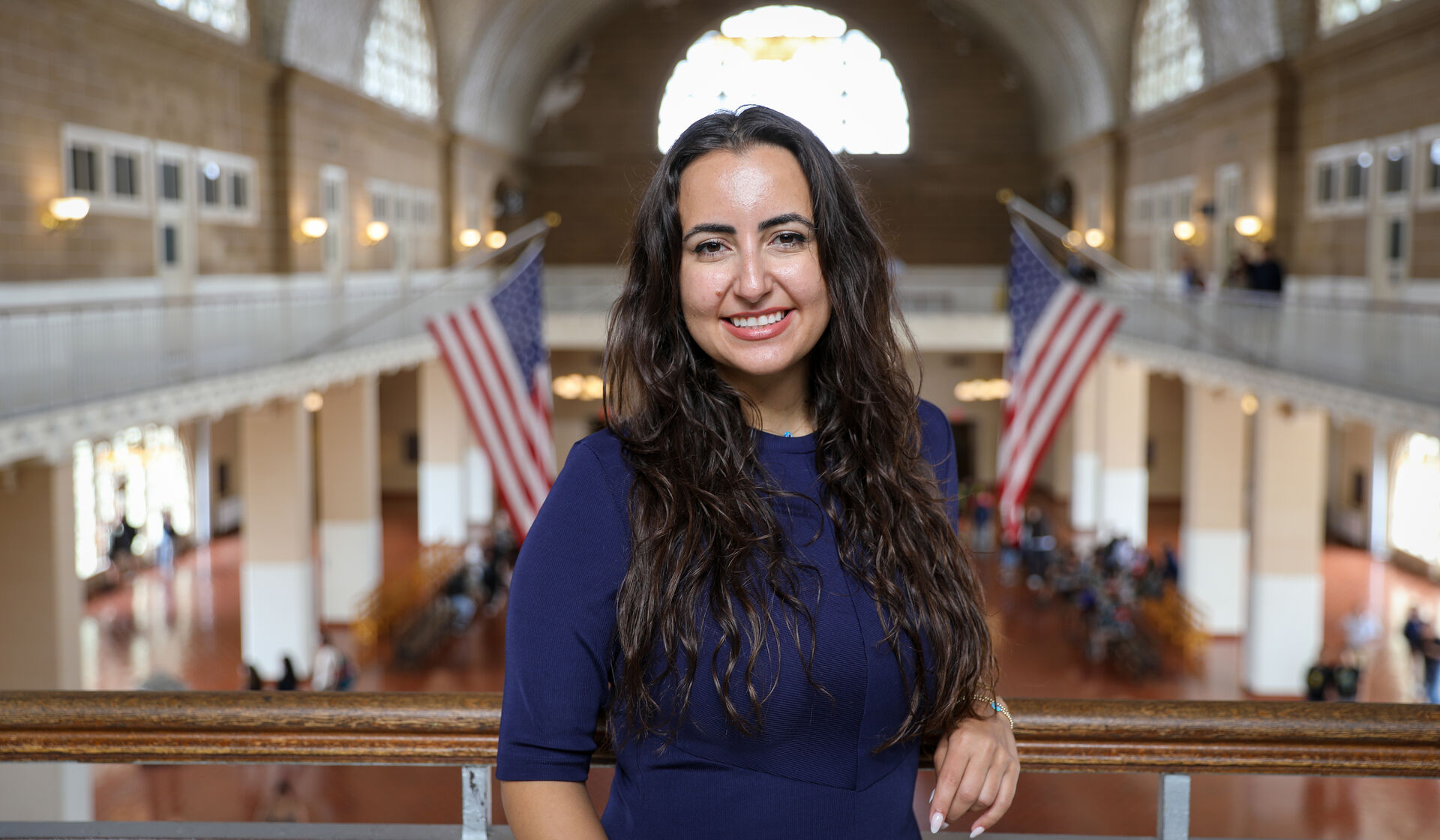Paul Saginaw and Ari Weinzweig started their specialty food dynasty in 1982 with Zingerman’s Delicatessen. Over the past three decades, Zingerman’s has grown into one of the most recognizable names in Ann Arbor and the food world.
Thoughts of Spring Commencement prompt images of Michigan Stadium, the sounds of “Pomp and Circumstance,” and the echoing voices of prominent figures sharing their vision of the future and lessons of the past. Lyndon Johnson delivered his “Great Society” speech at the Big House in 1964. In more recent decades, graduates have heard from U.S. presidents, a first lady (now presidential candidate), secretaries general of the United Nations, governors, celebrated journalists, and Internet CEOs.
This year, the assembled crowd heard from the guys who started the local deli.
That deli, of course, is no small concern. It has a coast-to-coast following, is regularly covered by the national media, and was dubbed “the Coolest Small Company in America” by Inc. magazine. It also has the endorsement of two former U-M commencement speakers: President Obama (2010 commencement speaker) described the Reuben sandwich as “killer” during a visit last year. And former Secretary of the Treasury Michael Blumenthal (1978 commencement speaker) was a faithful customer during the time he spent in Ann Arbor. Most importantly, its generous fare has sated the appetites of legions of U-M students.
Paul Saginaw, ’76, and Ari Weinzweig, ’78, co-founders of Zingerman’s Community of Businesses (ZCoB) are so well known around Ann Arbor that they are commonly referred to by their first names alone. As for the Zingerman’s name, it ranks third (tied with the city’s world-class medical facilities) among the things Ann Arbor is best known for, preceded only by Art Fair and the University itself, according to a 2014 study by the Ann Arbor Area Convention and Visitors Bureau.
Although both men are experienced public speakers, the crowd inside Michigan Stadium was roughly 50 times greater than any other they’ve faced. “It’s a really, really big gig for us,” Saginaw admitted before the speech. It’s also a really tall order.
In 126 years of U-M commencement addresses, there has never been a local business leader, let alone two. They were a novel choice for another reason. It was the first time that two speakers delivered one speech. But their easy repartee during the speech signaled a relationship that has developed over more than three decades and is grounded in shared values and a shared vision.
When asked why their partnership works so well, Saginaw replies: “Because Ari is on the road all the time.” Levity aside, he credits shared values, a shared vision, trust, and a willingness always to come back to the table. “And we don’t aspire to radically different lifestyles.”
Theirs is a vision that has fostered exponential growth over 33 years. When they started the deli in 1982, they borrowed $20,000 from the bank and $2,000 from Weinzweig’s grandmother. They had two employees. Today, ZCoB has 22 partners and 750 employees. Projected revenues for this fiscal year are $55 million. The affiliate businesses include Zingerman’s Delicatessen, Bakehouse, Creamery, Candy Manufactory, Mail Order, Coffee Company, Roadhouse, Cornman Farms (a large event space), Catering and Events, and ZingTrain, a management consulting business. Weinzweig calls ZCoB’s business model a loose form of Federalism—each affiliate operates separately although they all cooperate with one another—but their guiding tenants are rooted in a different political philosophy.
Weinzweig, who was a Russian history major, was fascinated by obscure thinkers, which led him to discover the Labadie Collection in the Graduate Library, with its pamphlets and publications devoted to radical politics. He seized on the writings of anarchists such as Emma Goldman, Mikhail Bakunin, and Prince Peter Kropotkin, among others. Anarchy in its original sense spoke to respect for the individual, which complements Weinzweig’s views against hierarchy and belief in “freely chosen collaboration in the interest of community.”
A prolific writer, Weinzweig applied his studies of anarchism to business and created the Zingerman’s Guide to Good Leading series, which covers topics from building a great business to providing great customer service. Every title begins with “A Lapsed Anarchist’s Approach to.” Former food columnist for the New York Times Magazine and cookbook author Molly O’Neill is a devotee. A few years ago, she started a small business and turned to the series for guidance. “Ari’s books really saved me,” she says. “Each one is just a little gem, and they are so accessible.” But you don’t need to own a business to reap their benefits, according to O’Neill. “You just have to have a life and the willingness to be inspired.”
“THEY STAND OUT AS AN EXEMPLAR OF A POSITIVE BUSINESS,” says Professor Wayne Baker of the Center for Positive Organizations at U-M’s Ross School of Business. Baker was a longtime Zingerman’s customer before he realized how much their philosophy meshed with his teaching. “They were living all that we were talking about and more,” says Baker. So he invited Weinzweig to address his class in 2005. Weinzweig has returned to Baker’s classroom several times since, as have other Zingerman’s partners. And Baker has produced four cases on various aspects of Zingerman’s organization.
The secret to Zingerman’s success cannot be defined by any one ingredient. “It’s a lot of things that work together in a systematic way,” says Baker. It starts with making the right hires and continues with extensive training and ongoing education. (Weinzweig and Saginaw give the orientation seminar for all new employees, even seasonal workers.) They also foster the idea of having employees think like owners. Toward that end, Zingerman’s engages in open book finance, meaning all employees have access to the financials. Everyone from manager to janitor can see how his or her decision can affect the bottom line. “They didn’t invent the (open book) concept,” says Baker, but “they’ve taken the model to new heights…they’re a living laboratory of all things positive.”
“I wish they had given the address for my commencement,” says Bill Flagg, ’92, who as a student so admired Zingerman’s that he wrote to Weinzweig telling him so. And Weinzweig, who still has a copy of that letter, wrote him back. Fifteen years later, they would meet in person. Flagg, then living in Boulder, Colorado, had just sold his software company and was contemplating opening a deli, so he contacted Weinzweig, who was less than enthusiastic about that idea. Flagg says Weinzweig told him that delis have horrible margins and that he should stick to what he knew. Weinzweig then invited him to Ann Arbor for a two-day ZingTrain workshop, after which Flagg decided to create his own community of businesses. Today, he has four companies with 120 employees and several operating partners, all based in Boulder and modeled after Zingerman’s structure. He estimates that he’s sent some 30 colleagues and partners to Ann Arbor for everything from open book finance to customer service and training to leadership and management. “There are very few companies like theirs who are consciously competent enough to teach how they did it.”
IN 2013, AFTER THE NATIONAL RESTAURANT ASSOCIATION issued a formal statement against raising the minimum wage, Saginaw responded with a Sept. 18 op-ed in the Detroit News in favor of a pay hike. “We would be irresponsible employers if the jobs we provided could not support housing stability and health security,” he wrote. Today, he maintains that there’s no sound economic argument for not raising the minimum wage.
His position caught people’s attention, notably in Washington, D.C., which ultimately led to a meeting with Secretary of Labor Thomas Perez. A few months later, President Obama made an “impromptu” stop at the deli during a trip to Ann Arbor to speak about increasing the minimum wage.
Zingerman’s is not only a model employer; it’s a model of corporate citizenship. Since 1988, the majority of Zingerman’s corporate giving has been directed toward alleviating hunger in Washtenaw County. Saginaw founded Food Gatherers, an independent nonprofit food rescue program and food bank that delivers more than 1 million pounds of food every year to people in need. He serves on the boards of many other local charities, too.
“Paul and Ari are icons of the Ann Arbor community, and together they have made an enormous impact both here in Ann Arbor and throughout the country,” says U-M President Mark Schlissel, whose favorite sandwich is the corned beef Reuben. “They have redefined what it means to do business and serve the local community. Zingerman’s employees are empowered in decision-making, and they share in the value they create. Through its location and its business model, Zingerman’s makes Ann Arbor a special place to live.”
During their commencement speech, Saginaw and Weinzweig reflected on the beliefs—such as generosity, kindness, and good work—that sustain them. “We believe that what we believe makes a big difference,” said Weinzweig. He added that it is those beliefs that “have helped build a business that, 33 years later, we both still love working in, literally, every single day.
Steve Rosoff, MA’87, is an Ann Arbor-based freelance writer, amateur chef, and gourmand who spent almost two decades writing copy for the J. Peterman catalog.





